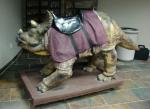
Paleontologists took a trip to Answers in Genesis's Creation "Museum" — and were dismayed, unsurprisingly, by what they saw. The Ninth North American Paleontological Convention was held June 21-26, 2009, at the University of Cincinnati, attracting several hundred paleontologists from around the world to present their latest research, as well as to attend a plenary session on evolution and society featuring NCSE's executive director Eugenie C. Scott. The organizers of the convention also offered a side trip to the nearby Creation "Museum," explaining that "it is essential for professional paleontologists to become better aware of how their work and their roles in society are portrayed by creationists, themes that are conveyed vividly at the museum."
Reporters accompanied the bemused paleontologists on their excursion, with stories subsequently appearing in the Cincinnati Enquirer (June 24, 2009), The New York Times (June 30, 2009), and Agence France-Presse (June 30, 2009). A few representative reactions from those stories: "I'm not offended, just annoyed" (Julia Sankey of California State University, Stanislaus); "I think they should rename the museum — not the Creation Museum, but the Confusion Museum" (Lisa Park of the University of Akron); "This bothers me as a scientist and as a Christian, because it's just as much a distortion and misrepresentation of Christianity as it is of science" (Daryl Domning of Howard University).
Scientific criticism of the Creation "Museum" is nothing new. When it opened in 2007, over 800 scientists in the three states surrounding it — Kentucky, Indiana, and Ohio — signed a statement sponsored by NCSE expressing concern about the effect of the scientific inaccuracies of its exhibits on local students. Shortly thereafter, the Society for Vertebrate Paleontology issued a press release contending that "the museum presents visitors with a view of earth history that has been scientifically disproven for over a century" and accusing it of "undermining the basic principles of science, eroding the public's confidence in science, and causing a general weakening of science education in the country."
